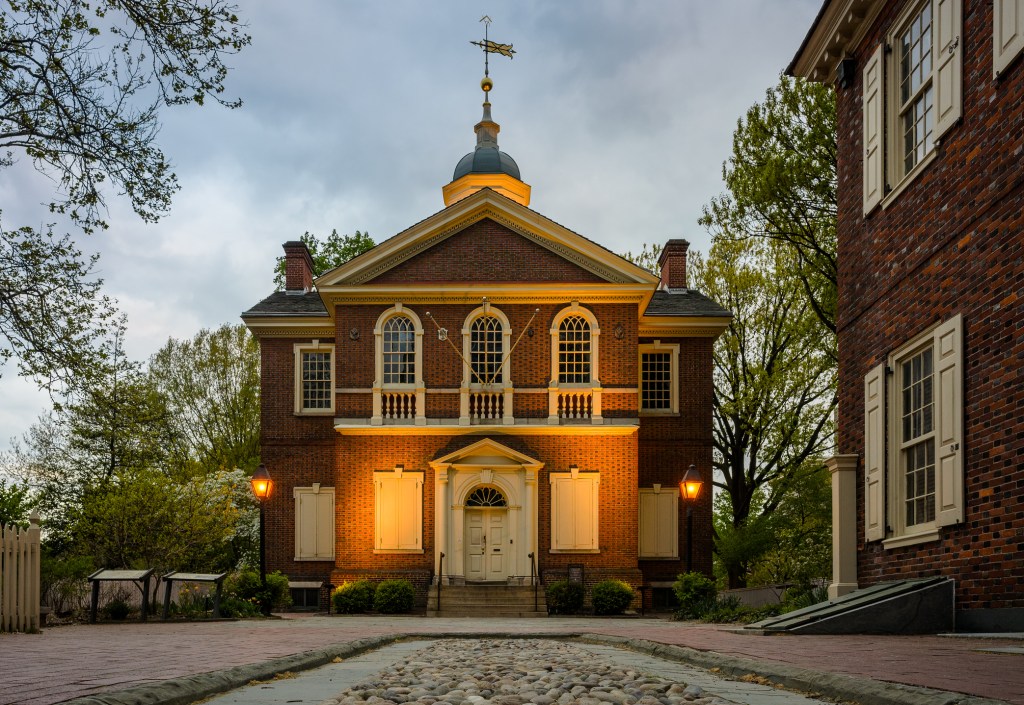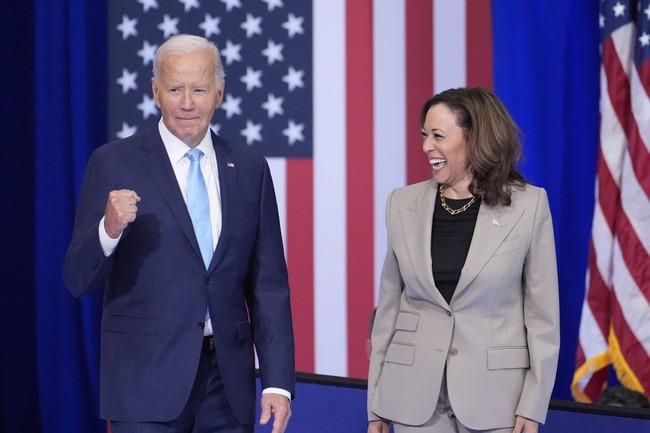
Shaere To Alt-Tech
This article was originally published on The Dispatch - Culture. You can read the original article HERE

“What do we mean by the American Revolution?”
John Adams might have mused these words in 1818, decades after the event, but the former president felt certain about this: The revolution “was effected before the war commenced.” It had begun some time before, “in the Minds and Hearts of the People.” Yet for most of the 1760s, no one envisioned a wholesale transformation in the relationship between the mother country and colonies, much less a severing of that relationship altogether.
So when, exactly, did the revolution begin?
That moment arguably came amid one of the seemingly less dramatic events of the revolutionary timeline: The First Continental Congress, which began 250 years ago today, on September 5, 1774, and lasted until late October of that year. It was a fairly placid affair; no iconic speeches stand out in the historical record, nor did it produce any monumental documents to rival the Declaration of Independence. If it’s considered today, the First Continental Congress is mainly remembered for its vote to convene its more famous successor the following year.
Yet the First Continental Congress was quietly momentous, a watershed moment in resistance to Britain’s policies. Overcoming sharp differences in regional culture, politics, and even views on how to combat British policies, the delegates of the First Continental Congress set in motion events that culminated in the dismemberment of the British Empire in North America.
The road to the congress.
In early December of 1773, a general calm prevailed in the colonies. Then tea brought it to a halt.
Parliament had sought to curb the financial struggles of the East India Company by granting it a legal monopoly in America. Bostonians were not pleased. Dozens of them swarmed the company’s ships in the city’s harbor on the night of December 16, 1773. Anywhere from 30 to potentially more than 100 men (estimates vary) boarded the company’s vessels and dumped 342 chests of tea into the harbor.
The reaction among American colonists to what came to be known as the Boston Tea Party was far from unanimous. Some, of course, responded with gleeful delight. Others supported the sign of protest but were happy to consider offering the East India Company compensation as part of a negotiated settlement. And there were more law-and-order-minded patriots who wanted to see vigorous, peaceful resistance to British tyranny but found the spectacle distasteful. Even George Washington fell into this camp.
These disparate reactions speak to wider divisions in colonial American society. There was not, at this point, anything close to a consensus on virtually any issue. For one thing, people did not identify as American; they were Virginians, New Englanders, Philadelphians, local people with local concerns. In addition, bitter feelings still lingered over how quickly some colonies abandoned boycotts on British imports in the past decade. It remained an open question whether the American colonies would ever muster the collective will to work together in any kind of effective manner. There were also sharp differences regarding what protests should look like. For some firebrands, like the Massachusetts delegate Samuel Adams, only the most forceful and militant expressions of American rights would suffice. The most conservative colonists, on the other hand, sought the mildest possible approach to convey grievances to the king.
If the British had played their cards more carefully, they might have turned this lack of consensus into real fractures among American leaders. But with thousands of pounds worth of tea floating in Boston’s harbor, London was finished with conciliation and ready to put the subordinate relationship of the colonies on firm ground.
Britain promptly closed the port of Boston, stripped Massachusetts of any semblance of self-government, and granted the British military much greater power to quarter troops in suitable locations at colonial expense. These laws—either the Coercive Acts or the Intolerable Acts, depending on if one favored Parliament or American protesters—whipped the colonies into a fury. Closing the port of Boston naturally sparked outrage, but dissolving the Massachusetts Charter created a special fear in the heart of every colonist up and down the seaboard.
London claimed nothing less than the right to abolish colonial governments at will, without the slightest consultation. Every delegate to every colonial legislature now was on notice that he served purely at the pleasure of a faceless body across the ocean. Thousands of Americans—none of whom were radicals—would come to find common cause with Boston.
Yet it took time. In response to the Intolerable Acts, Adams led the charge in the Massachusetts Assembly demanding a complete shutdown of American commerce with Britain and the West Indies. If Britain wanted to strangle Boston’s economy, then the same treatment was good enough for them. To the Massachusetts radicals’ dismay, almost no one agreed. Too many Americans made their living off such trade to be eager to switch off the economy.
The Massachusetts Assembly, a bit miffed that no one was willing to follow its lead for more draconian measures, tried to rally the rest of the colonies by passing the Solemn League and Covenant. This measure cut off commercial intercourse between Massachusetts and the British Empire, with hopes that other colonies would follow their example. The Assembly publicized the Solemn League and Covenant with appropriate fanfare, but little traction. By mid-June of 1774, it was clear that the rest of the colonies were not, as yet, ready for an economic war (much less the other kind of war).
But instead, a healthy consensus arose around the idea of a united congress, one that would demonstrate Americans’ unified disgust at the Intolerable Acts and convey their demands for recognition as loyal, but indisputably equal, members of the British Empire.
Navigating factionalism.
When 48 delegates from 12 colonies (Georgia being the sole missing colony) gathered in Philadelphia on September 5, 1774, for the First Continental Congress, they had little in common. They held starkly different religious beliefs, and New Englanders and Southerners hailed from cultures so markedly different as to almost amount to foreign countries. The dozen separate colonies represented did not even have a uniform agreement on how many shillings were in a pound.
Such divisions showed up immediately in a rancorous debate on whether votes would be cast individually or by colony, even though some tried to downplay the fractures. “Distinctions between Virginians, Pennsylvanians, New Yorkers and New Englanders, are no more,” insisted Patrick Henry, “All America is thrown into one Mass.” Meanwhile John Jay, among the more conservative delegates, sharply contradicted the Virginia firebrand. “I can’t yet think that all Government is at an End,” he said, concluding that the colonies should refrain from trying to create a single “America” and instead focus on resolving tensions with Britain.
Henry’s protean nationalism was not entirely unselfish. He spoke out in favor of the delegates voting individually, rather than giving each state one vote. As Henry’s home of Virginia dwarfed many of the small states in population, this would have worked greatly to Virginians’ benefit—and for that reason was a nonstarter to virtually every delegate from the smaller colonies. Eventually, the realities of regional politics prevailed, and the Congress established a one-vote-per-colony structure.
No sooner had they reached a reluctant agreement on voting procedures than the whole body was thrown into turmoil by reports that the British navy had begun shelling Boston. Allegedly, British soldiers had clashed with colonial militia, and the bloodshed had provoked the Royal Navy to unleash indiscriminate broadsides on the population. The rumors turned out to be false, but the war scare did have one salutary effect: It prodded the Congress to a unanimous acceptance of the Suffolk Resolves.
Arriving by the hand of express rider Paul Revere on September 16, the Resolves from a convention in Suffolk County, Massachusetts, offered one of the boldest and unambiguous statements of American rights and grievances among the many protest documents sprouting up across New England. The Resolves blasted Britain for attempting to impose “endless and numberless curses of slavery” upon the colonies, and they swore that the colonies would never submit themselves to “the arbitrary will of a licentious minister.” In similarly explosive language, they promised not to obey in any regard the Intolerable Acts and to impose a full economic boycott until Britain yielded. They also vowed not to pay taxes until their demands were met, as well as to police their neighbors and impose penalties on anyone violating the boycott.
The Suffolk Resolves left no ambiguity as to Americans’ expectations. They didn’t bring about an unreserved victory for the most militant of colonists, though. The Resolves made their point to one audience in London, but they also served—it was hoped—to place constraints on another audience in Massachusetts. The Resolves also condemned “riots or licentious attacks upon the properties of any person whatsoever,” and, though they called for militias to train vigorously for a possible conflict, they also insisted that force be used “merely upon the defensive.” As the historian Jack Rackove notes, “Most delegates probably hoped to restrain the conduct of resistance in Massachusetts within the lines drawn by the Suffolk Resolves themselves. Only if British General Thomas Gage used force to carry out his policies would the people be justified in taking stronger measures.”
The firebrands at the helm.
The easy passage of the Suffolk Resolves showed that the firebrands held a decided advantage over the reconciliationists. Joseph Galloway, a Pennsylvanian at the far end of the conservative camp, made a last-ditch effort to change that. Galloway called for an American parliament, with a single representative from each state, that would have equal standing with Parliament. Its approval would be required for any legislation affecting the colonies to be implemented. Galloway still left the colonies in a decidedly subordinate role, however. The American legislature would be overseen by a crown-appointed president, and the monarch would still enjoy the right to name governors of each colony and nullify legislation passed by colonial assemblies.
Still, it was a near thing. Galloway’s plan was only tabled by a 6-5 vote, with Rhode Island deadlocked. Patrick Henry likely breathed a sigh of relief that he had lost earlier. If voting had been tallied by a majority of all delegates, Galloway’s motion would likely have avoided being tabled. That would have resulted in a lengthy, doubtless ugly debate that could have easily crippled the Congress.
With Galloway’s plan dispensed with, the delegates moved on to organizing a plan for resistance. Generally, everyone fell in line about banning British imports. Cutting off all exports to the rest of the British Empire was another matter, though. Virginia spoke for all the southern colonies when it noted that it had already harvested crops—at substantial expense—and had them ready to ship out. Virginia’s stance elicited no small degree of grumbling from New Englanders. A boycott that would not take effect for over a year was hardly a crushing blow. Indeed, it raised the possibility that further delays would become “necessary” by the time the ban on exports was finally scheduled to take effect. Again, however, maintaining unity took precedence over the details. A delayed boycott by the colonies was far better than a series of ad-hoc measures imposed by separate regions. The Virginians got their way this time; the ban on exports was slated for a year in the future, in September 1775.
Boycotts were only as good as the willingness of Americans to fulfill them. In this, the First Continental Congress delivered beyond anything that had been known in the Americas before. The Continental Association would be backed by hundreds of committees of enforcement, elected across the colonies to monitor their respective towns, cities, or counties for anyone violating the embargo. This was not an open invitation to plunder private property or, worse, sic mobs on deviants. The committees’ power of enforcement was limited to ensuring that the names of violators were “published in the Gazette, to the End that all such foes to the rights of British America may be publickly known and universally condemned as the Enemies of American Liberty; and thence forth we respectively will break off all Dealings with him, or her.” Social pressure was the order of the day for maintaining compliance with the embargo. That should not muddy the dramatic step being taken, though. While previous attempts at economic coercion had been built purely on an appeal to patriotism, the First Continental Congress had finally created a formal, legal set of bodies for backing up the embargo.
It worked. Over the next year, British imports were gutted to a degree never approached by earlier boycotts. And the local committees had another impact—they created a mass of some 7,000 Americans who now held a direct part in the resistance to British tyranny, and thus produced the local leaders who would become crucial in the years ahead for keeping the flame of revolution alive in the war years.
Those who still placed hope in the Crown and the smooth restoration of harmony demanded a final petition to King George beseeching him to intervene on behalf of his American subjects against the evils of Parliament. Professing unswerving loyalty to their “Most Gracious Sovereign” the petitioners listed their grievances and proclaimed that they “earnestly beseech your majesty that your royal authority and interposition may be used for our relief.” The petition was a necessary concession to the most ardent reconciliationists, but plenty of delegates anticipated, correctly, that it would be ignored in London. They allowed the petition to smooth the path for the publication they really wanted: a declaration of American rights.
The Declaration and Resolves—also commonly referred to as the Declaration of Rights—minced no words: Americans were entitled to all the rights of Englishmen. They could not be taxed without their consent. They could not have British troops quartered in their colonies without the explicit approval of their own legislatures. They could not be deprived of their property without their consent. They could not be prevented from peacefully assembling and petitioning for redress of grievances. They could not be tried outside their own colonies and could not be found guilty except by a jury of their peers. Indeed, they were just as entitled to “life, liberty, and property” as any other Englishman, and they demanded in unambiguous language that Parliament repeal all acts obnoxious to their liberties.
The Declaration and Resolves did not offer room for compromise. Either London would affirm and safeguard Americans’ rights and liberties, or it would face the consequences. Those hoping for a placid sorting of differences with the mother country had been unable to leave the door open for any concessions on Parliamentary supremacy. When word of the Resolves reached the wider American public, it was clear to all that Samuel Adams and his compatriots had fully vanquished the likes of Joseph Galloway. A disheartened pamphleteer lamented that the Congress had “left us no retreat, nor the mother country any opening to advance to reconciliation.” Presciently, another future Loyalist complained that he had hoped the delegates to Philadelphia would be agents of peace, but instead they had become “the Heralds of War.”
The First Continental Congress closed by urging each colony to ramp up arming and drilling its militia. While all still hoped war could be avoided, it was obvious that violent negotiations were a possibility. We know now that the American colonies not only took up arms and spilled blood, but they even rallied to the cause of independence and formed a new nation. That was still an anathema to virtually all Americans in October of 1774, when the First Continental Congress disbanded. Indeed, the limits on colonial economic coercion and the insistence on another appeal to the king fell short of the most ambitious delegates’ hopes.
Still, something remarkable had taken place those six weeks in Philadelphia: A dozen distinct colonies had spoken with one voice in defense of their rights. They had rejected the authority of Parliament over colonial affairs and demanded nothing less than true self-governance. Thomas Jefferson’s resounding statement that the colonies in America “are and of right ought to be free and independent” lay over a year in the future, but the spark that would eventually ignite into a history-making blaze had been lit.
This article was originally published by The Dispatch - Culture. We only curate news from sources that align with the core values of our intended conservative audience. If you like the news you read here we encourage you to utilize the original sources for even more great news and opinions you can trust!










Comments